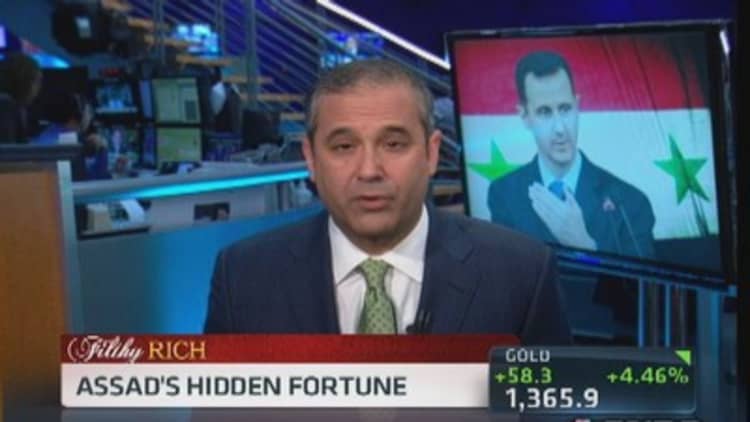
The average citizen in Syria makes about $2,600 a year, according to 2010 figures from the World Bank. But the inner circle of Syrian President Bashar Assad lives much, much larger.
"It's a typical family business," said Jules Kroll, chairman and co-founder of the international investigation firm K2 Intelligence. "Except the family business is a country."
Analysts have pegged Assad's personal net worth at between $550 million and $1.5 billion. The president's official website and Instagram page glisten with images of the impeccably tailored Assad and his elegant, former investment banker wife Asma. But the pictures—and the first couple—only begin to tell the story.
With interests in real estate, airlines, energy and telecommunications, the Syrian regime is believed to control a fortune worth well into the billions. For years, U.S. authorities have targeted that money in hopes of destabilizing the regime.
In particular, the U.S. has set its sights on Syrian businessman Rami Makhlouf, a cousin of Assad believed to be worth $5 billion. A 2008 State Department cable uncovered by WikiLeaks calls Makhlouf "Syria's poster boy for corruption," and suggests highlighting his activities in hopes of eroding public support for the regime.
(Read more: US, Russia agree on Syria chemical weapons plan)
"Corruption is a theme that resonates here, as every Syrian has been a victim of it," the cable said.
The cable, which preceded a move by the U.S. Treasury Department later that year to designate Makhlouf as a beneficiary of the regime's corruption, lays out a strategy to maximize the impact of the designation.
"In some of the largest economic sectors—electricity, petroleum, and telecommunications—Makhlouf has used government instruments to squeeze out legitimate businessmen, receive lucrative public contracts, establish cash cows and then milk them with impunity from oversight or competition," the cable said. "Significantly, several of his ventures exploit weaknesses in the Syrian economy and undermine reform efforts while increasing the burden on Syria's lower classes."
Makhlouf claims to be a legitimate businessman, and at the start of the Syrian uprising in 2011, he vowed to cease some of his most lucrative business activities—including his controlling interest in Syria's largest mobile telephone provider—and direct the profits to charity. Syrian rebels derided the move as a charade, and it is not clear Makhlouf actually followed through.
Western sanctions against Syria, which intensified in 2011, may only be moving the Assad family fortune further underground, experts say, since the regime has plenty of ways around them.
(Read more: Assad denies his forces conducted chemical attack)
"I think the sanctions have had a limited effect," Kroll said. "They have enough people they can trade with, do business with, bank with, that I think the amount of the effect of these sanctions would be actually quite modest."
Indeed, the Treasury Department says that since 2011, it has managed to seize just $80 million, though the administration says the effort is impacting the regime by devaluing Syria's currency.
A long-running civil suit in U.S. courts against the Syrian regime has provided a tiny glimpse into the complexity of Syria's finances and the regime's ability to evade sanctions.
The families of Jack Hensley and Olin Eugene "Jack" Armstrong, American contractors who were brutally slain in Iraq in 2004, sued the Syrian government as a state sponsor of terrorism. In 2008, a federal court awarded the families a judgment of more than $400 million. But collecting that judgment has so far been unsuccessful.
While an attorney for the families declined to comment, court papers show they reached what appeared to be a breakthrough in 2012 when they discovered a payment owed by AT&T to Syrian Telecom. Blocked under U.S. sanctions from paying the bill, AT&T held some of the money in its internal accounts, and deposited the rest into a special, blocked account with JPMorgan Chase.
The amount of the funds is redacted from the court papers, but it has been enough to trigger a three-year legal battle between the families of the contractors and others who have laid claim to Syrian assets.
A source with knowledge of the case says it shows how complicated it will be to unwind the Assad family fortune, the true extent of which may never be known unless the regime falls.
—By CNBC's Scott Cohn. Follow him on Twitter @ScottCohnCNBC. Additional Reporting by Sabrina Korber.


